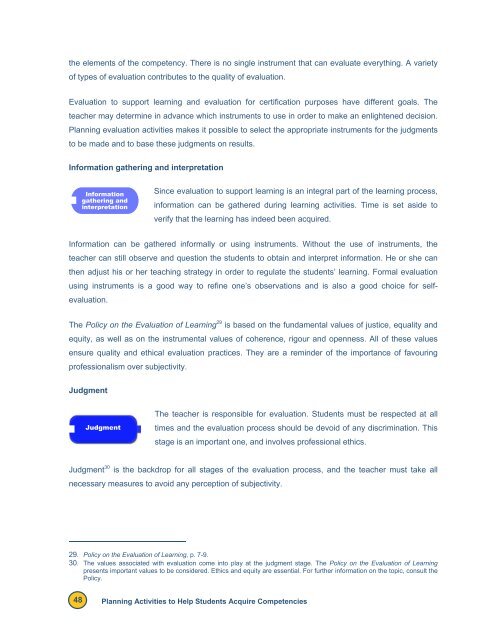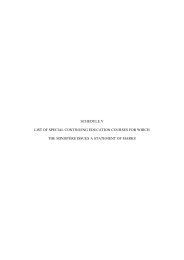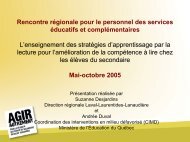Reference Framework for Planning Learning and Evaluation Activities
Reference Framework for Planning Learning and Evaluation Activities
Reference Framework for Planning Learning and Evaluation Activities
Create successful ePaper yourself
Turn your PDF publications into a flip-book with our unique Google optimized e-Paper software.
the elements of the competency. There is no single instrument that can evaluate everything. A variety<br />
of types of evaluation contributes to the quality of evaluation.<br />
<strong>Evaluation</strong> to support learning <strong>and</strong> evaluation <strong>for</strong> certification purposes have different goals. The<br />
teacher may determine in advance which instruments to use in order to make an enlightened decision.<br />
<strong>Planning</strong> evaluation activities makes it possible to select the appropriate instruments <strong>for</strong> the judgments<br />
to be made <strong>and</strong> to base these judgments on results.<br />
In<strong>for</strong>mation gathering <strong>and</strong> interpretation<br />
In<strong>for</strong>mation<br />
gathering <strong>and</strong><br />
interpretation<br />
Since evaluation to support learning is an integral part of the learning process,<br />
in<strong>for</strong>mation can be gathered during learning activities. Time is set aside to<br />
verify that the learning has indeed been acquired.<br />
In<strong>for</strong>mation can be gathered in<strong>for</strong>mally or using instruments. Without the use of instruments, the<br />
teacher can still observe <strong>and</strong> question the students to obtain <strong>and</strong> interpret in<strong>for</strong>mation. He or she can<br />
then adjust his or her teaching strategy in order to regulate the students’ learning. Formal evaluation<br />
using instruments is a good way to refine one’s observations <strong>and</strong> is also a good choice <strong>for</strong> selfevaluation.<br />
The Policy on the <strong>Evaluation</strong> of <strong>Learning</strong> 29 is based on the fundamental values of justice, equality <strong>and</strong><br />
equity, as well as on the instrumental values of coherence, rigour <strong>and</strong> openness. All of these values<br />
ensure quality <strong>and</strong> ethical evaluation practices. They are a reminder of the importance of favouring<br />
professionalism over subjectivity.<br />
Judgment<br />
Judgment<br />
The teacher is responsible <strong>for</strong> evaluation. Students must be respected at all<br />
times <strong>and</strong> the evaluation process should be devoid of any discrimination. This<br />
stage is an important one, <strong>and</strong> involves professional ethics.<br />
Judgment 30 is the backdrop <strong>for</strong> all stages of the evaluation process, <strong>and</strong> the teacher must take all<br />
necessary measures to avoid any perception of subjectivity.<br />
29. Policy on the <strong>Evaluation</strong> of <strong>Learning</strong>, p. 7-9.<br />
30. The values associated with evaluation come into play at the judgment stage. The Policy on the <strong>Evaluation</strong> of <strong>Learning</strong><br />
presents important values to be considered. Ethics <strong>and</strong> equity are essential. For further in<strong>for</strong>mation on the topic, consult the<br />
Policy.<br />
48 <strong>Planning</strong> <strong>Activities</strong> to Help Students Acquire Competencies




